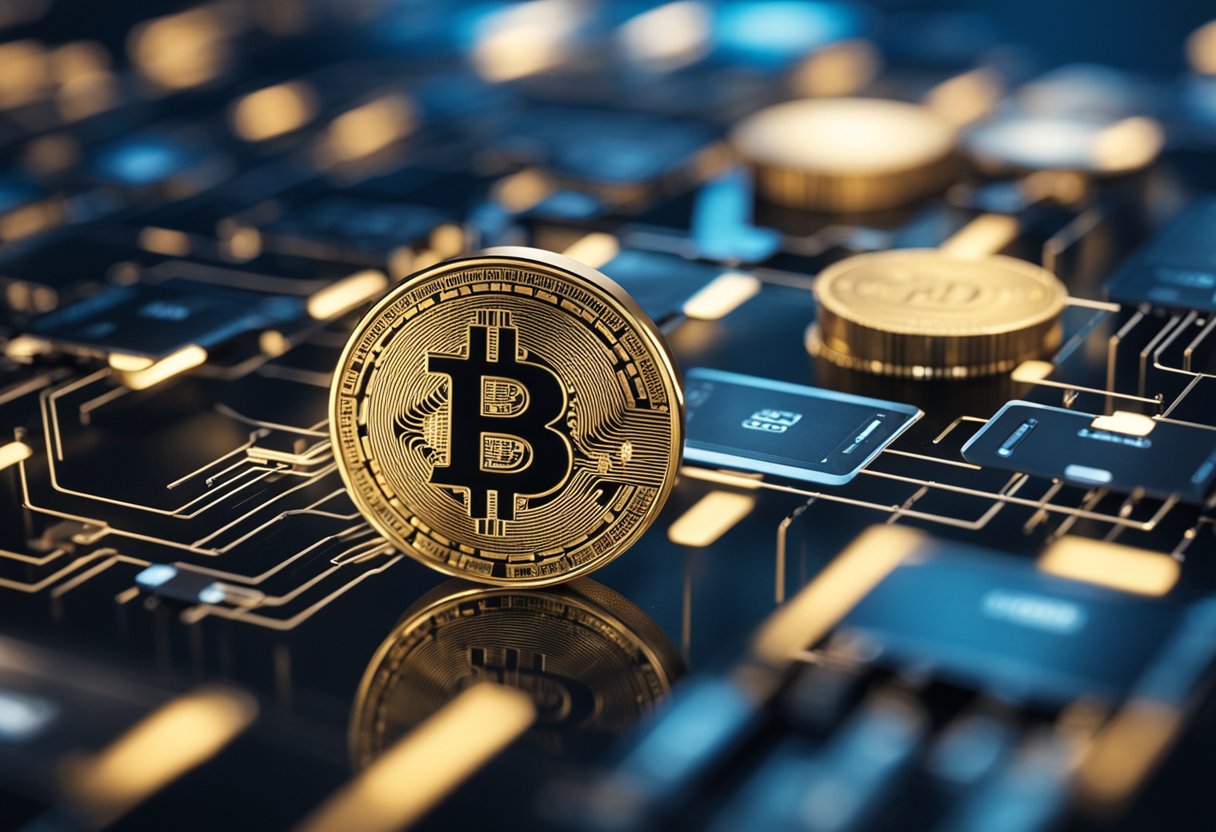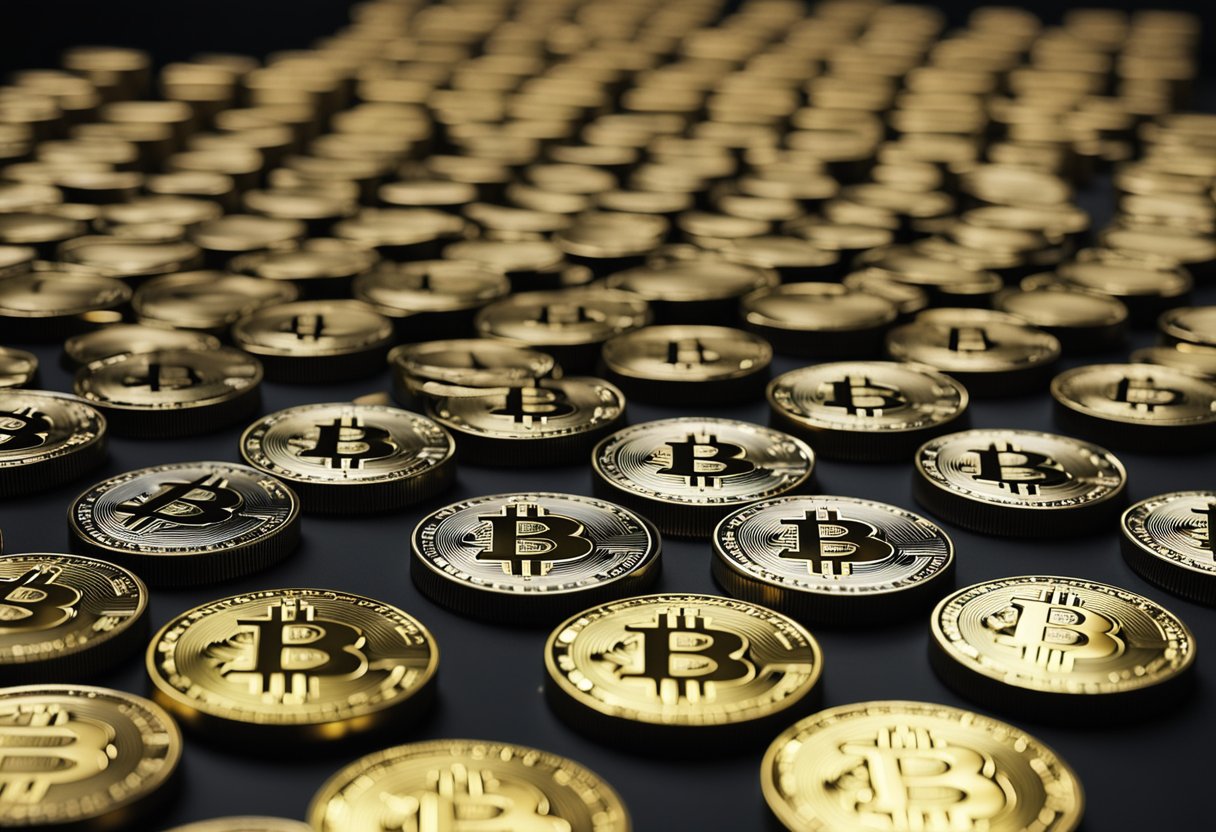Decentralized Finance (DeFi) Revolutionizes Post-Trade Processes
Explore how DeFi is transforming post-trade processes. Learn about the benefits and challenges of this innovative technology with our expert insights.

Decentralized finance (DeFi) has gained momentum in recent years, disrupting the traditional financial system with its innovative and decentralized approach. DeFi is a new financial system built on blockchain that enables peer-to-peer transactions without intermediaries. This new economic system can transform how we trade, invest, and settle transactions.
Understanding Decentralized Finance
DeFi is a new financial system that operates on a decentralized network, enabling users to transact directly with each other without the need for intermediaries. It is built on blockchain technology, which ensures transparency, security, and immutability of transactions. DeFi applications are open-source, meaning that anyone can access and use them, and they operate 24/7, unlike traditional financial systems that have specific operating hours.
Evolution of DeFi and Its Impact on Traditional Finance The rise of DeFi has challenged the traditional financial system, which is centralized and heavily regulated. DeFi has given users greater control over their assets, reduced transaction costs, and increased accessibility to financial services. This has led to a shift in the balance of power, where users are now in control of their financial transactions rather than financial institutions.
Key Takeaways
- DeFi is a new system built on blockchain technology, enabling peer-to-peer transactions without intermediaries.
- DeFi can potentially transform how we trade, invest, and settle transactions.
- The rise of DeFi has challenged the traditional financial system, enabling users to have greater control over their assets, reduced transaction costs, and increased accessibility to financial services.
Understanding Decentralized Finance
Decentralized Finance (DeFi) is an emerging financial technology that uses blockchain to manage financial transactions. It aims to democratize finance by replacing legacy, centralized financial systems with peer-to-peer networks that allow for transparent and secure transactions. DeFi applications are built on top of blockchain technology, which provides a secure and decentralized way to store and transfer value.
One of the critical features of DeFi is the use of smart contracts. Smart contracts are self-executing contracts programmed to execute automatically when certain conditions are met. They are used to facilitate transactions between parties without the need for intermediaries. This allows for faster, cheaper, and more secure transactions.
DeFi has the potential to disrupt traditional finance by offering a range of financial services that are accessible to anyone with an internet connection. These services include lending, borrowing, staking, and trading. DeFi applications are open to anyone, and there are no restrictions on who can participate.
However, there are also risks associated with DeFi. Because it is a relatively new technology, many unknowns and uncertainties remain. Smart contracts are not infallible, and there is a risk that they could be hacked or exploited. Additionally, because DeFi is decentralized, there is no central authority to oversee and regulate potentially these risks; DeFi has the potential to revolutionize the financial industry by offering a more open, transparent, and accessible financial system. As more people become aware of the benefits of DeFi, we will likely see continued growth and innovation in this space.
Evolution of DeFi and Its Impact on Traditional Finance

Decentralized Finance (DeFi) is a blockchain-based financial system that aims to provide open and permissionless access to fines and products without the need for intermediaries, such as banks or traditional financial institutions. DeFi is a brand-new idea or an expansion of the Distributed Finance or Open Finance concept. It refers to a financial business environment without a single governing authority.
DeFi has grown in popularity in recent years and is seen as a disruptive force in the financial industry. It has the potential to revolutionize traditional finance by providing a more open, transparent, and accessible financial system. DeFi is built on the blockchain, a decentralized and distributed ledger that enables secure and transparent transactions without intermediaries.
DeFi is a new form of innovation that has the potential to transform the financial services industry. It is expected to significantly impact traditional finance by providing a more efficient and cost-effective way of providing financial services. DeFi creates new financial products and services that are impossible in conventional finance, such as decentralized exchanges, lending platforms, and prediction markets.
One of the biggest advantages of DeFi is that it is accessible to anyone with an internet connection, providing financial services to the unbanked and underbanked populations. DeFi eliminates intermediaries, promoting peer-to-peer transactions, which can reduce costs and increase efficiency.
However, Several challenges need several challenges need to be addressed. One of the biggest challenges is the lack of regulation, which can lead to increased risks for participants and the markets. DeFi is vulnerable to intelligent contract bugs, and participants lose significant losses.
In conclusion, DeFi is an innovative and disruptive force in the financial industry that has the potential to transform traditional finance. It offers a more open, transparent, and accessible financial system that can provide new financial products and services. However, challenges still need to be addressed, such as regulation and security.
Role of Blockchain in DeFi

Decentralized Finance (DeFi) is a blockchain-based financial infrastructure that has recently gained a lot of traction. The term generally refers to an open, permissionless, and highly interoperable protocol stack built on public smart contract platforms like the Ethereum blockchain. DeFi leverages the decentralized nature of blockchain technology to provide open and permissionless access to financial services and products without intermediaries, such as banks or traditional financial institutions.
Blockchain is the underlying technology that powers DeFi. It is a distributed ledger technology that allows for secure, transparent, and immutable record-keeping. In the context of DeFi, blockchain technology is used to create smart contract-based financial instruments, such as decentralized exchanges (DEXs), lending platforms, and prediction markets.
The decentralized nature of blockchain technology is a key enabler of DeFi. Unlike traditional financial systems, which rely on centralized intermediaries, DeFi is designed to be decentralized from the ground up. This means there is no single point of failure, and no single entity controls the system. Instead, DeFi protocols are governed by a decentralized network of users who collectively make decisions about the direction of the system.
The use of blockchain technology in DeFi also enables greater transparency and auditability. Since all transactions on the blockchain are recorded transparent and immutable, it is possible to audit the entire history of a DeFi protocol and verify that it is operating as intended. This is in contrast to traditional financial systems, where the system's inner workings are often opaque and difficult to audit.
Overall, the role of blockchain technology in DeFi is to enable a new paradigm of financial infrastructure that is open, transparent, and decentralized. By leveraging the power of blockchain, DeFi has the potential to disrupt traditional financial systems and provide greater financial inclusion and access to a wider range of financial products and services.
Smart Contracts and Protocols

Smart contracts are self-executing contracts that are coded with predefined rules and regulations. They are designed to execute automatically based on certain conditions and are stored on a blockchain. Smart contracts are an integral part of decentralized finance (DeFi) as they enable the creation of decentralized protocols that can facilitate transactions without the need for intermediaries.
Decentralized protocols are open-source software programs that enable the creation of decentralized applications (dApps). These protocols are designed to be transparent, secure, and immutable, and they facilitate the creation of financial products and services in a decentralized manner. Decentralized protocols are also highly interoperable, which means that they can interact with other protocols and dApps seamlessly.
Blockchain technology is at the core of DeFi, providing the necessary infrastructure for creating decentralized protocols and smart contracts. Blockchain technology enables the creation of a distributed ledger maintained by a network of nodes, making it difficult for any single entity to manipulate the data on the ledger. This makes blockchain technology highly secure and transparent, essential for creating financial products and can potentially develop protocols that have the potential to revolutionize post-trade in the financial industry. They can facilitate the creation of decentralized marketplaces that can enable the trading of financial assets without the need for intermediaries. Smart contracts can also automate the settlement process, which can reduce the time and cost associated with post-trade activities.
In conclusion, smart contracts and protocols are essential components of DeFi, and they can potentially transform post-trade in the financial industry. They enable the creation of decentralized marketplaces and automate the settlement process, which can reduce the time and cost associated with post-trade activities. Blockchain technology provides the necessary infrastructure for creating these protocols and smart contracts, enabling the creation of secure and transparent financial products and services.
Regulation and Governance in DeFi

Decentralized Finance (DeFi) has emerged as a rapidly growing economic application built on blockchain networks. IIT aims to create an open-source, permissionless, transparent financial system without central authority. However, as DeFi applications become more interconnected with traditional markets, there is a growing need for regulation and governance to mitigate risks and ensure compliance with Anti-Money Laundering (AML) laws.
Regulation in DeFi is still in its early stages, and there is a lack of clarity on how existing laws and regulations apply to DeFi protocols. This has led to concerns about the potential for regulatory arbitrage and the need for a coordinated approach to regulation across jurisdictions. The lack of centralized control in DeFi also makes it challenging to enforce regulations and ensure compliance.
Governance is another critical aspect of DeFi, as it determines how decisions are made about the development and operation of DeFi protocols. Most DeFi protocols are governed by decentralized autonomous organizations (DAOs), which are run by a community of token holders who vote on proposals. While this model offers high transparency and decentralization, it also challenges society.
Some DeFi projects have implemented various governance models to address these challenges, such as delegated voting or quadratic voting. These models aim to balance decentralization with effective decision-making and accountability. Additionally, some DeFi protocols have implemented AML and Know Your Customer (KYC) measures to comply with regulatory requirements and mitigate risks.
In summary, regulation and governance are critical components of the DeFi ecosystem. As DeFi continues to grow and become more interconnected with traditional finance, it is essential to establish clear regulatory frameworks and effective governance models to ensure compliance with laws and mitigate risks.
Security Concerns in DeFi

Decentralized Finance (DeFi) is a relatively new and rapidly growing sector of the blockchain industry. While it offers many benefits, such as increased accessibility and transparency, it also presents several security concerns.
One of the primary security concerns in DeFi is the risk of smart contract vulnerabilities. Smart contracts are self-executing contracts with the terms of the agreement between buyer and seller being directly written into lines of code. However, if there is a flaw in the code, it can be exploited by attackers, leading to loss of funds. According to a survey of DeFi security, smart contract vulnerabilities are the most significant security risk in DeFi [1].
Another security concern in DeFi is the risk of hacking and theft. Since DeFi operates in a decentralized environment, tracing and recovering stolen funds can be difficult. In challenging, the lack of regulation in the DeFi space means that users are often left to their own devices when it comes to securing their assets.
Furthermore, DeFi governance is another issue that can lead to security concerns. GDeFi governance occurs in decentralized autonomous organizations (DAOs), which spread decision-making power among all interested stakeholders. However, since the voting process is often based on token ownership, it can lead to centralization and increase the risk of a 51% attack [2].
Overall, security concerns in DeFi are a significant challenge for participants and policymakers. Addressing these concerns will be crucial for the long-term success and sustainability of the DeFi industry.
[1] A survey of DeFi security: Challenges and opportunities. (2022). ScienceDirect. https://www.sciencedirect.com/science/article/pii/S1319157822003792
[2] Decentralized finance: 4 challenges to consider. (n.d.). MIT Sloan. https://mitsloan.mit.edu/ideas-made-to-matter/decentralized-finance-4-challenges-to-consider
DeFi in Post-Trade Settlement
(DeFi) can potentially revolutionize post-trade settlement in capital markets. The current post-trade process involves multiple intermediaries, which can lead to increased costs, inefficiencies, and counterparty risks. DeFi can eliminate the need for intermediaries by using blockchain technology to create a trustless, transparent, and efficient settlement process.
In traditional post-trade settlement, clearinghouses act as intermediaries between buyers and sellers, ensuring that trades are settled correctly and efficiently. However, clearinghouses can be expensive to operate, and their centralized nature can create a single point of failure. DeFi protocols can replace clearinghouses by automating the settlement process through smart contracts, which execute trades automatically when certain conditions are met.
One of the main advantages of DeFi in post-trade settlement is the reduction in counterparty risk. In traditional settlement, buyers and sellers are exposed to the risk of default from their counterparties. However, DeFi protocols use collateralized lending, which reduces counterparty risk by requiring borrowers to put up collateral for their loans.
Another advantage of DeFi in post-trade settlement is the reduction in settlement times. Traditional settlement can take up to two days to complete, but DeFi protocols can settle trades instantly, reducing the time and cost of settlement.
However, there are also challenges to implementing DeFi in post-trade settlement. One challenge is the lack of regulatory clarity around DeFi protocols, which can create uncertainty and limit adoption. Another challenge is the potential for smart contract bugs or hacks, which can lead to significant losses for users.
Despite these challenges, the potential benefits of DeFi in post-trade settlement are significant. By eliminating intermediaries, reducing counterparty risk, and increasing efficiency, DeFi can transform the way capital markets operate.
DeFi and Cryptocurrencies

Decentralized Finance (DeFi) is an emerging financial technology that utilizes blockchain to provide financial services not dependent on traditional intermediaries such as banks. DeFi solutions are built on decentralized networks that allow users to transact with each other directly, without the need potentially. This technology can potentially revolutionize the financial industry by providing financial services to people currently excluded from the traditional financial system.
Cryptocurrencies are digital assets that use cryptography to secure transactions and control the creation of new units. Cryptocurrencies are a key component of DeFi solutions and are used as collateral for loans and other financial services. Crypto assets are often more volatile than traditional assets, which can make them riskier to use as collateral. However, using smart contracts and other blockchain technology can mitigate some of these risks.
The use of blockchain technology in DeFi solutions provides several benefits over traditional financial services. For example, blockchain technology allows for transparent and immutable records of transactions, which can increase trust and reduce the risk of fraud. Additionally, blockchain technology allows for faster and cheaper transactions, which can make financial services more accessible to people who are currently excluded from the traditional financial system.
Overall, DeFi solutions and cryptocurrencies have the potential to revolutionize the financial industry by providing access to financial services to people who are currently excluded from the traditional financial system. However, it is important to be aware of the risks associated with these technologies, such as the volatility of crypto assets and the potential for fraud.
DeFi and Operational Efficiency

Decentralized Finance (DeFi) has the potential to revolutionize the financial industry by providing a more efficient, transparent, and accessible financial system. One of the key benefits of DeFi is the potential to improve operational efficiency, particularly in post-trade processes.
Traditionally, post-trade processes have been plagued by inefficiencies due to legacy systems, manual processes, and intermediaries. These inefficiencies result in increased costs, longer settlement times, and higher risks of errors and fraud. DeFi, on the other hand, leverages blockchain technology and smart contracts to automate and streamline post-trade processes, reducing costs and improving speed and accuracy.
DeFi also enables the management of financial assets in a more efficient manner. By leveraging blockchain technology, DeFi platforms can provide real-time visibility into asset ownership and movement, reducing the need for intermediaries and improving transparency. This can result in significant cost savings and faster settlement times.
Moreover, DeFi platforms can enable the management of financial assets in a more decentralized manner. By eliminating intermediaries, DeFi can provide greater control and ownership of financial assets to individual investors, reducing the need for centralized institutions and improving potential conclusions. DeFi can potentially enhance operational efficiency and management of financial assets by leveraging blockchain technology and smart contracts. By automating and streamlining post-trade processes, DeFi can reduce costs, improve speed and accuracy, and provide individual investors greater control and ownership of financial assets.
Future of DeFi

DeFi has seen tremendous growth and innovation in a short period of time. As technology matures, it is expected to play an increasingly important role in the financial industry. The future of DeFi is bright, with many experts predicting that it will become a significant force in the financial world.
One of the most significant impacts of DeFi is its potential to disrupt traditional financial institutions. By removing intermediaries and allowing for peer-to-peer transactions, DeFi has the potential to significantly reduce costs and increase transparency. This innovation in finance has already led to the creation of new fintechs that are leveraging DeFi to offer innovative financial services.
Furthermore, DeFi is expected to play a significant role in the future of open banking. Open banking is a movement that seeks to increase competition and innovation in the banking industry by allowing third-party providers to access bank data. DeFi can further this goal by providing a decentralized platform for financial transactions that is open to anyone.
As DeFi continues to grow, it is expected to drive further innovation in the financial industry. This innovation will likely lead to new financial products and services that were previously impossible to create. Additionally, DeFi will likely lead to the creation of new business models that leverage the power of decentralized finance.
Overall, the future of DeFi is bright, with many experts predicting that it will become a significant force in the financial world. As the technology continues to mature, it is expected to drive further innovation and disruption in the financial industry.


